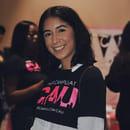No one person’s Black experience is identical to another. As a collective, black folk undergo a spectrum of encounters within their life based not only on their race but their social status, access to resources, their skin color, etc. While racial identities may be identical, one’s skin color can determine the amount of racism experienced in comparison to another due to America’s roots in colorism.
Colorism is founded on Eurocentric values, praising the existence of lighter/white passing skin complexions within colored communities. Historically, and currently, lighter skin is connected to higher levels of privilege, the societal standard of beauty, wealth, and intelligence. Being a student at an HBCU has allowed me to interact with various forms of colorism more than I ever expected it to. As noted in my articles: Anti-Blackness Within The Latinx Community and Being Latina At An HBCU, my ethnic background is what composes a majority of my life experiences and ideologies of race vs. ethnicity and where they overlap.
Being Puerto Rican besets ancestral ties to those Indigenous to the island, Spanish conquistadors, and African roots as the result of colonization, The African Diaspora, and slavery.
The mixture that this ancestry provides serves as the basis of confusion as everyone’s Puerto Rican experience is ethnically shared, but, racially divided.
It, therefore, poses the question of: What features make one black or white “enough” to be classified under that racial identity? In the same breath, for those who poses a mixture of said features, where do they lie on the black or white spectrum? Therefore, those who are ethnically Puerto Rican can poses features that may be classified as racially white, racially black, or racially ambiguous, like myself.
As a student of not only Clark Atlanta University, but a student to the Atlanta University Center, that also houses both Spelman and Morehouse College, my college matriculation has presented me with intriguing experiences regarding skin color and the standard it holds just within the AUC alone. Upon my arrival to the AUC, I was commonly confused for a Spelmanite, though I had yet to spend time on Spelman’s campus.
When I inquired about the confusion I was given answers like “You just look like you go there”, “You hold yourself in a way that they do”, or my personal favorite “Because you’re bougie.” As I reflected on this common misconception, I wondered what does a woman of Spelman College “look like”?
As I explored both campuses, I realized the indication was clear, and the similarity that I had in common with the “appearance” of Spelman women, was light skin. Once I noted that, I began to reflect on what was said about Spelman women that I was told I poses: outward appearance, a manner of “intelligence”, and “wealth”–synonymous to me within being boujie.
Within my complete reflection of these scenarios, I realized how rampant colorism is on campus due to how the color of one’s skin can be pinned to what institution they may attend. Additionally, I realized how little people thought of Clark Atlanta women in comparison to Spelman woman. If Spelmanites “hold themselves” in a certain “respected” manner, or “look” a certain way, what does that make Clark Atlanta women out to be? Simply put, less than. And that is not the case.
As a woman with racially and ethnically ambiguous features, I run into the impact of colorism far too often. How being black but not “black enough” can ostracize one from the black community and the white community simultaneously because the features you poses are too much or too little of what each standard requires of members of their community.
On campus, I work every day to dismantle the historic impact of colorism by showcasing the importance of acceptance through interpersonal education. Primarily educating those around me on the impact of African descent within the Latinx community and what blackness may or may not mean to that community.
In addition to that avocation, I enforce and support that my sisters on campus who poses skin darker than a brown paper bag, do uphold “respectable” mannerisms as collegiate black women, regardless of their institution, or the color of their skin.
In lieu of Black History Month, it is prominent that we are to note the impact of our history presently, but we are also to work on dismantling toxic, historical, structures while building a future for our community as a whole.


